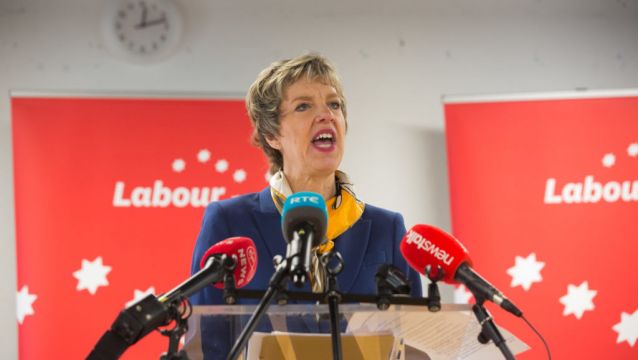Ivana Bacik's first task as newly-appointed Labour Party leader will be ensuring its survival, according to a politics professor.
Ms Bacik will be faced with uniting the party and attracting voters back to Labour, a party still suffering from the aftermath of its involvement in the Fine Gael-led coalition Government, which oversaw harsh austerity measures in the aftermath of the financial crash.
DCU Professor of Politics Gary Murphy told BreakingNews.ie: "In one way the main objective is to survive in the short term and in the medium term to make the party more attractive politically again.
'Survival'
"In the short term, I don’t think it’s too extreme to say the very survival of the party should be the main aim and then to grow it incrementally."
The political commentator added: "The electorate seems to have its mind made up that Labour’s participation in the 2011-16 government leaves them needing a full purging so to speak.
"In the space of less than a decade it has had five leaders, that’s an extraordinary amount of turnover."
Mr Murphy said the immediate challenge for Labour is the competition in left wing politics.
"You have the Social Democrats now, who are sort of an offshoot of Labour, resulting from the split when Róisín Shortall left. If you look at their policy there is no substantial differences. Also, there are the Greens, then those on the hard left who have taken a significant amount of those who would have seen Labour as their natural home.
"Fianna Fáil also consider themselves to be soft centre-left, so there are many parties looking for that particular space."
Mr Murphy cited Ms Bacik's win in the Dublin Bay South by-election last June as one of the few election positives for the party in recent times after poor showings in the 2016 and 2020 general elections.
"The general election results of 2016 compared to 2020 show stagnation at best, even the seats its winning, Labour is not winning them comfortably.
"Would I expect Ivana Bacik to win in Dublin Bay South the next time? I probably would, but I wouldn’t be putting my mortgage on it either."
Difficulties and opportunities
While Labour faces "significant difficulties," Mr Murphy said there are also "significant opportunities".
"They have some very good parliamentarians. Duncan Smith in Dublin Fingal, Ged Nash, most of the parliamentary party is very able.
"The trouble is if you are an undecided voter, consider yourself on the left and think the State should make a bigger difference in people’s lives, you’re probably looking at Sinn Féin now."
Mr Murphy said Ms Bacik should be looking to the 2024 local elections as an opportunity to rebuild the grassroots of the party, and in turn build foundations for the next general election which is likely to take place in 2025.
"The important thing is the next local elections in 2024, and a general election likely the year after. If they can get decent local election results that will position them well to have good candidates to run for the Dáil.
"That’s what she needs to have her eye on, Labour needs to rebuild itself by trying to get good people elected at local level. That will be the first national electoral test for her."
Leadership change can often be difficult for parties, but Mr Murphy feels Ms Bacik is starting on a solid footing as she is still on good terms with Alan Kelly.
"Leadership coups can be extremely messy and maybe that’s part of the problem with Labour going back to when they got rid of Eamon Gilmore a few years after the tremendous success of 2011, things got no better under Joan Burton and then when they went for Brendan Howlin they continued to decline. That’s the great worry in one way for Labour.
"However, they have a new leader who is bright, articulate, hard-working, campaigning for decades as she said in her press conference, and has been on the right side of social issues. Changing leader in and of itself won’t make Labour competitive again in a variety of constituencies, so there is a lot of work to be done.
"In rural Ireland it's sort of wiped out, its seats and where it can be competitive are Dublin, Louth, Wicklow etc.
"It hasn’t been competitive in Cork in recent elections, but there’s no reason it shouldn’t be, so these are the short term challenges to make sure Labour can survive and carve out a special voice for itself on a competitive left. In the long term it’s to rebuild the party."
Rebuilding
The shadow of austerity still looms large over Labour, and Mr Murphy said Ms Bacik will have to move focus on the party into the future. He reiterated that rebuilding on a local level will be important to this.
"The language on the hard left that Labour sold out is difficult for them to defend, particularly a decade on. It has to be about going forward rather than trying to defend their past.
"That’s easier said than done when faced with the constant barbs it faces over its membership of that government.
"The important thing is the next local elections in 2024, and a general election likely the year after. If they can get decent local election results that will position them well to have good candidates to run for the Dáil.
"That’s what she needs to have her eye on, Labour needs to rebuild itself by trying to get good people elected at local level. That will be the first national electoral test for her.
"They need to rally around her 100 per cent, and she needs to tour the country and rejuvenate the grassroots of the party, get decent local election candidates and rebuild from there.
"They’ve had five leaders in a decade, so it’s time they stick with her for the long haul, at least two elections."







